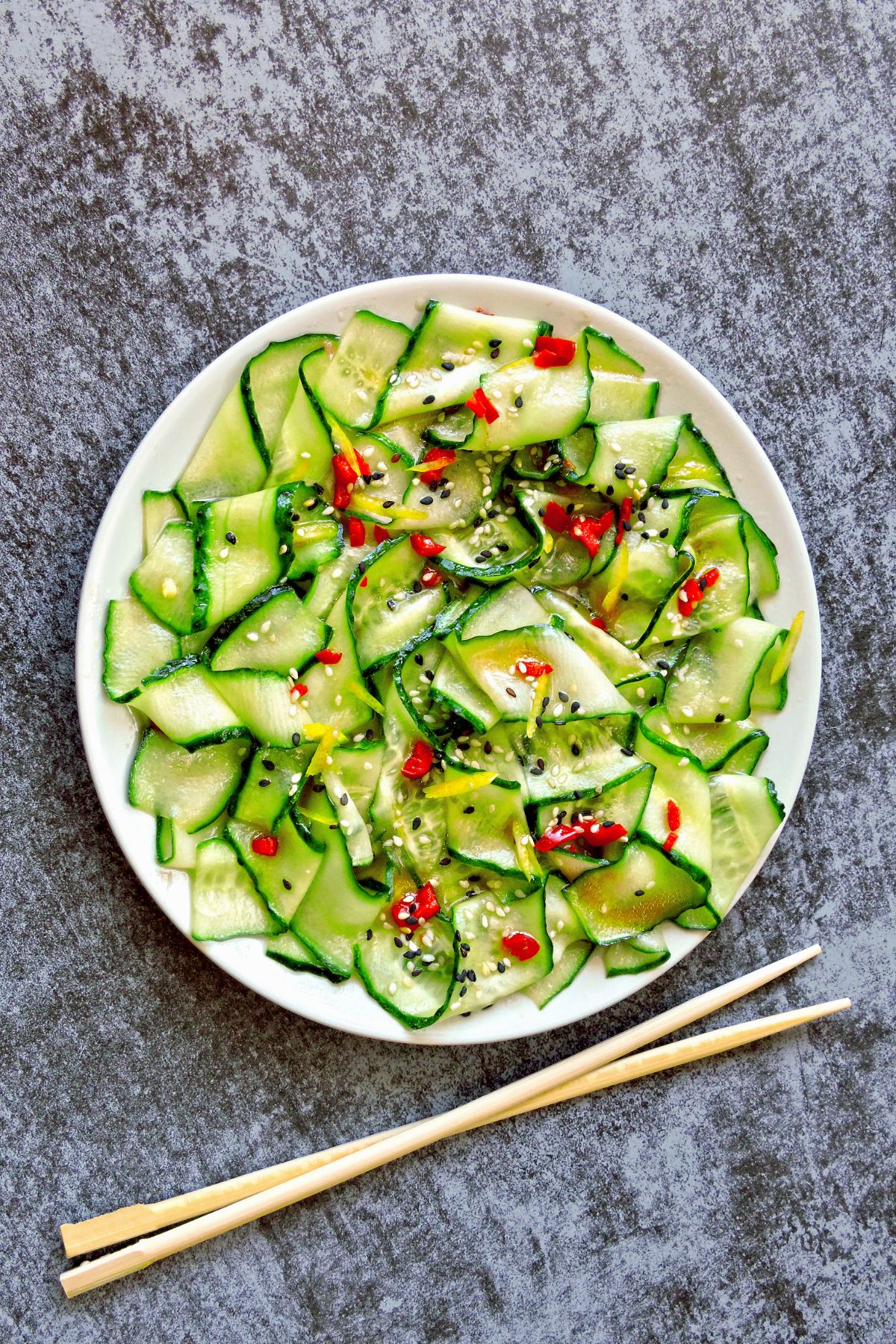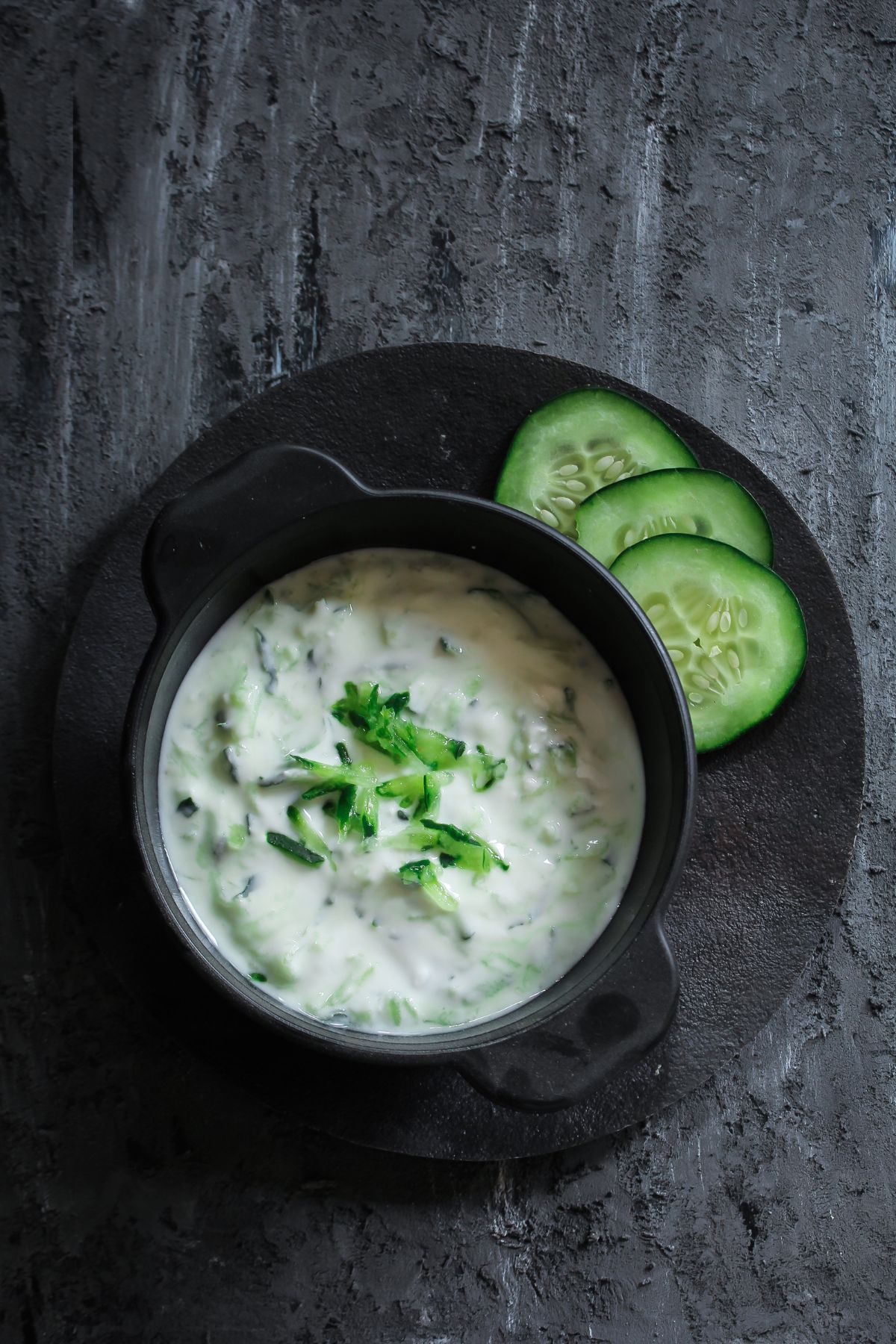Is cucumber low FODMAP? The purpose of this blog post is to delve into and clarify the relationship between cucumber and the low FODMAP diet. Understanding what foods you can safely enjoy is crucial to managing irritable bowel syndrome (IBS) symptoms and maintaining a healthy, balanced diet. So, let’s uncover the role of cucumbers in a FODMAP-friendly lifestyle, ensuring you have the information needed to make informed dietary choices.

Learn more about FODMAPs in mushrooms, peanut butter, coffee, beans, grapes, corn, almonds, and pineapple.
Table of Contents
FODMAPs are a group of short-chain carbohydrates that are not well absorbed in the small intestine. The acronym stands for Fermentable Oligo-, Di-, Monosaccharides, and Polyols. These include sugars like fructose, lactose, fructans, galactans, and polyols such as sorbitol and mannitol.
For individuals with IBS and similar gastrointestinal disorders, FODMAPs can cause significant discomfort. This is due to the undigested sugars drawing water into the intestine and fermenting there by gut bacteria, which causes symptoms like bloating, gas, stomach pain, constipation, and diarrhea.
Researchers at Monash University invented the low-FODMAP diet, which aims to lessen these symptoms. It involves temporarily eliminating high-FODMAP foods from the diet and then gradually reintroducing them to identify personal triggers. This diet has been a revelation for many, offering relief and a better quality of life to those sensitive to these carbohydrates.
Health Benefits of Cucumber
Here are some of the health benefits of cucumber:
- Hydration: Cucumbers are composed of about 95% water, making them excellent for promoting hydration.
- Nutrient-Rich: Despite being low in calories, cucumbers contain several important vitamins and minerals, such as vitamin K, vitamin C, and potassium.
- Supports Digestive Health: The fiber in cucumbers helps maintain healthy digestion and prevents constipation.
- Blood Pressure Regulation: Potassium in cucumbers can help regulate blood pressure levels.
- Antioxidant Properties: Cucumbers have antioxidants like flavonoids and tannins, which can reduce inflammation and protect against cellular damage.
- Weight Management: Their low calorie and high water content make cucumbers a great addition to weight loss diets.
- Skin Health: The hydration and vitamin C found in cucumbers can support skin health, potentially improving skin hydration and elasticity.
Is Cucumber Low FODMAP?
When it comes to managing a low-FODMAP diet, understanding the specific FODMAP content of foods is crucial. So, is cucumber low FODMAP? The good news is, yes. Both Lebanese cucumber and continental cucumber are recognized as low in FODMAPs when consumed in portions of 1/2 cup or 75 grams, making them suitable for inclusion in a low FODMAP diet. At this serving size, cucumbers contain minimal levels of FODMAPs that typically trigger symptoms, including fructose, lactose, mannitol, sorbitol, GOS, and fructan. Thus, individuals adhering to a low-fodmap dietary approach can safely enjoy cucumbers within the suggested 75-gram portion.
1/2 cup or 75 grams of Lebanese and continental cucumbers are suitable for inclusion in a low-FODMAP diet.
Nevertheless, consuming cucumber in moderate to large servings can lead to a higher intake of fructose, potentially triggering symptoms for individuals with IBS.
Table: Cucumber Serving Sizes And FODMAP Levels
| FODMAP Level | Serving Size |
| Low FODMAP | 75g (1/2 cup) |
| Moderate FODMAP | 360g |
| High FODMAP | 545g |
Eating cucumber in moderate to large servings can lead to a higher intake of fructose, potentially triggering symptoms.

Are Pickles Low FODMAP?
Diving into the world of pickles, it’s important to understand how their preparation impacts their suitability for a low-FODMAP diet. While pickles start their life as cucumbers, which are naturally low in FODMAPs, the pickling process can introduce variables that affect their final FODMAP content.
The main consideration with pickles is the brine solution used in their preparation. This solution often contains vinegar, water, and a variety of seasonings and sugars. High-FODMAP ingredients such as garlic and onion are common in many pickle recipes, which can leach FODMAPs into the pickles over time, increasing their FODMAP levels.
However, pickles made without these high FODMAP additives are typically low FODMAP and are acceptable for consumption in moderation by those following a low FODMAP diet. It’s essential for individuals to check the ingredient list on store-bought pickles. Avoiding products with garlic, onion, or other high-FODMAP ingredients is key to staying within FODMAP thresholds.
For those who enjoy pickles and are navigating a low-FODMAP diet, there’s good news. You can make your own low-FODMAP pickles at home using cucumbers, vinegar, water, and low-FODMAP herbs and spices. This allows you to enjoy the tangy crunch of pickles without worrying about unintended FODMAP intake.
Are Pickled Gherkins (Small Cucumbers) Low FODMAP?
Gherkins, often confused with or considered a type of small pickle, also warrant a closer look within the context of a low-FODMAP diet. Just like their larger cucumber cousins, gherkins start as low-FODMAP foods. However, the pickling process can influence their final FODMAP content, primarily due to the ingredients used in the brine.
The brine solution for gherkins commonly includes vinegar along with sugar, salt, and spices. High-FODMAP ingredients, such as onions or garlic, might be added for flavor, potentially raising the FODMAP level of the finished product. Thus, the key to enjoying gherkins on a low-FODMAP diet lies in the specifics of their preparation.
For individuals on a strict low-FODMAP diet, especially during the elimination phase, homemade gherkins can be a safer alternative. By pickling your own gherkins with vinegar, water, and low-FODMAP seasonings, you can ensure they fit within your diet without triggering symptoms.
Is Cucumber Juice Low FODMAP?
Monash University has not conducted tests on cucumber juice.
Given that raw cucumbers are free of FODMAPs, cucumber juice is expected to share this characteristic. However, it’s essential to verify that the juice is made solely from cucumbers and doesn’t include any additional ingredients high in FODMAPs.
When preparing cucumber juice, it’s essential to:
- Use fresh cucumbers without the skin, as the skin can be harder to digest for some people.
- Avoid adding high FODMAP fruits or vegetables to the juice. Stick to low FODMAP options if you desire a blend.
- Check for any added ingredients if purchasing pre-made cucumber juice to ensure it does not contain high FODMAP sweeteners or flavors.
The Impact of Preparation Methods on FODMAP Levels in Cucumbers
Understanding how different preparation methods can impact the FODMAP content of cucumbers is essential for anyone managing a low-FODMAP diet. While cucumbers are naturally low in FODMAPs, certain ways of preparing them can alter their digestibility and FODMAP levels, affecting those with IBS or lactose intolerances.
Raw Cucumbers: Consuming cucumbers raw is the most straightforward way to ensure they remain low in FODMAP. Sliced cucumbers can be added to salads, eaten as a snack, or included in recipes without any concern for increasing FODMAP levels.
Pickled Cucumbers: As previously discussed, pickling cucumbers can introduce high-FODMAP ingredients such as garlic and onion into the mix. However, pickling cucumbers at home with vinegar, salt, and low-FODMAP herbs can preserve their low-FODMAP status while adding a flavorful twist.
Cucumber Juice: Juicing cucumbers is another preparation method that maintains their low FODMAP quality, provided no high FODMAP fruits or additives are mixed in. In small servings, cucumber juice offers a refreshing, hydrating option suitable for a low-FODMAP diet.
Cooked Cucumbers: Cooking cucumbers is less common but can be done in dishes like stir-fries or soups. Cooking does not significantly alter the FODMAP content of cucumbers.
Marinated Cucumbers: Marinating cucumbers in a low-FODMAP dressing is a safe way to add flavor without adding FODMAPs. Avoid marinades with high FODMAP ingredients to keep the dish IBS-friendly.

Incorporating Cucumber into a Low FODMAP Diet
Incorporating cucumber into a low-FODMAP diet is not only easy but also beneficial, thanks to its versatility, hydrating properties, and the fact that it is well-tolerated by most people with IBS or lactose intolerances. Here are some creative ways to include cucumber in your diet, along with recipes and meal ideas.
- Cucumber Salad: A simple and refreshing cucumber salad, dressed with olive oil, soy sauce, lemon juice, salt, and pepper, can be a staple side dish. For variety, add low-FODMAP vegetables like bell peppers and tomatoes.
- Infused Water: Slices of cucumber can be added to water for a refreshing drink that helps with hydration and adds a spa-like luxury to your daily water intake.
- Tzatziki Sauce: Make a low-FODMAP tzatziki by using lactose-free yogurt, grated cucumber, lemon juice, dill, and a pinch of salt. This sauce pairs well with grilled chicken or tofu.
- Sushi Rolls: Use cucumber sticks and edamame as a filling for sushi rolls, combined with low-FODMAP ingredients like cooked shrimp or imitation crab meat (check for additives) and avocado.
- Cucumber Sandwiches: Use gluten-free bread to create cucumber sandwiches with a layer of arugula and lactose-free cream cheese. Add chives and dill for extra flavor without adding FODMAPs.
- Coleslaw: Incorporate thinly sliced cucumber into a coleslaw with celery, beets, carrots (in moderation), cilantro, and a low FODMAP dressing made from rice vinegar, lime juice, and a touch of sugar.
- Cucumber Canapés: Top cucumber slices with a spread of lactose-free cream cheese and smoked salmon, garnished with dill, for a quick, elegant appetizer.
Navigating Food Labels: Identifying Low FODMAP Cucumber Products
For individuals following a low FODMAP diet, understanding how to read and interpret food labels is crucial, especially when selecting cucumber products like pickles, relishes, or pre-packaged salads. Here are some tips for navigating food labels to ensure the cucumber products you choose are low in FODMAPs and suitable for your diet.
- Check the Ingredients List: Look for any high FODMAP ingredients commonly added to cucumber products, such as garlic, onion, high-fructose corn syrup, and certain vinegars (like malt vinegar, which is derived from barley). These ingredients can turn a potentially safe product into one that might trigger IBS symptoms.
- Look for Low FODMAP Certifications: Some products may carry certifications or endorsements from reputable low FODMAP organizations or programs, indicating they’ve been tested and are considered safe for a low FODMAP diet.
- Identify Natural and Artificial Flavors: These terms can be ambiguous and may sometimes include high-FODMAP ingredients. If a product label lists “natural flavors” or “artificial flavors” without specificity, and you’re in the elimination phase of your diet, it may be safer to avoid these products until you can confirm their FODMAP status.
- Serving Size Matters: Even if a cucumber product is free from high FODMAP ingredients, consuming it in large quantities may still lead to discomfort. Pay attention to the serving sizes indicated on the label and adjust your intake accordingly.
- Identifying Hidden FODMAPs: Hidden FODMAPs can sometimes make their way into cucumber products through additives and preservatives. Be watchful of ingredients such as inulin, lactose, and fructans that can increase the FODMAP content of the food product.

Key Takeaways
As we conclude our exploration of cucumbers and their place within a low-FODMAP diet, let’s recap the key points to remember:
- Cucumbers Are Low FODMAP: In their raw form, cucumbers are low in FODMAPs and are safe to consume in recommended servings of 1/2 cup or 75 grams, making them a refreshing and hydrating choice for those with IBS.
- Preparation Matters: While cucumbers themselves are low FODMAP, certain preparation methods, especially pickling with high FODMAP ingredients like garlic and onion, can introduce FODMAPs. Opt for homemade or carefully selected store-bought options that avoid these additives.
- Reading Labels Is Crucial: For pre-packaged cucumber products, scrutinizing labels for high FODMAP ingredients and serving sizes is essential to avoid triggering IBS symptoms.
- Individual Tolerance Varies: Personal tolerance levels to cucumbers and other low FODMAP foods can differ. Gradually introducing new foods and monitoring your body’s response is key to identifying what works best for you.
- Are Potatoes Low FODMAP? Adding Spuds Wisely For IBS - March 15, 2024
- Is Watermelon Low FODMAP? Tips for Eating With IBS - March 13, 2024
- Are Blueberries Low FODMAP? Discover The Digestive Benefits - March 12, 2024
